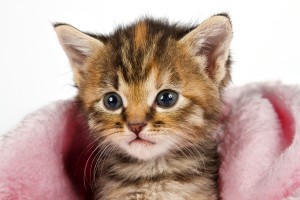 Is your kitten vaccinated for feline leukemia virus?
Is your kitten vaccinated for feline leukemia virus?
You may not have thought to do so if you plan for him to be an indoor cat, but veterinary immunology expert Ronald Schultz, DVM, says that vaccination during kittenhood, followed by a single booster vaccination at 1 year of age, is the best way to prevent the spread of the disease and reduce its incidence.
Feline leukemia virus is the most common cause of cancer in cats and can cause various blood disorders. Some cats with the disease have poor immune systems and are unable to fight off infections. Signs of the disease include appetite loss, weight loss, poor coat condition, pale gums and persistent diarrhea. In the United States, 2 to 3 percent of cats have the virus.
That’s a low percentage, but it’s still a serious disease that is highly communicable. Infected cats shed the virus through bodily fluids such as saliva, milk, urine and feces. They can spread it when they groom other cats, share food and water bowls, or use the same litter box.
Read more in this week’s Pet Connection…

